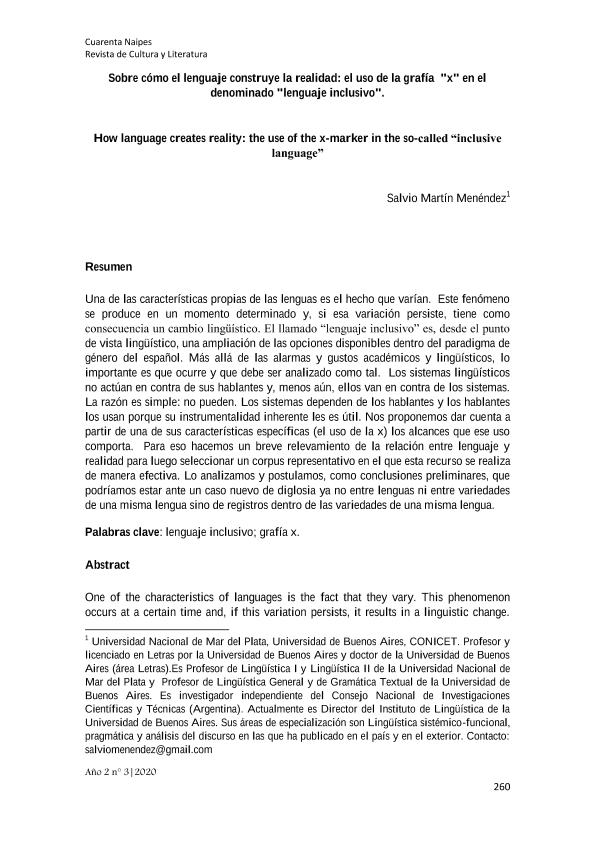Mostrar el registro sencillo del ítem
dc.contributor.author
Menendez, Salvio Martin

dc.date.available
2022-10-14T14:58:33Z
dc.date.issued
2020-12
dc.identifier.citation
Menendez, Salvio Martin; Sobre cómo el lenguaje construye la realidad: el uso de la grafía "x" en el denominado "lenguaje inclusivo"; Universidad Nacional de Mar del Plata. Facultad de Humanidades; Cuarenta Naipes; 3; 12-2020; 260-274
dc.identifier.uri
http://hdl.handle.net/11336/173243
dc.description.abstract
Una de las características propias de las lenguas es el hecho que varían. Este fenómeno se produce en un momento determinado y, si esa variación persiste, tiene como consecuencia un cambio lingüístico. El llamado “lenguaje inclusivo” es, desde el punto de vista lingüístico, una ampliación de las opciones disponibles dentro del paradigma de género del español. Más allá de las alarmas y gustos académicos y lingüísticos, lo importante es que ocurre y que debe ser analizado como tal. Los sistemas lingüísticos no actúan en contra de sus hablantes y, menos aún, ellos van en contra de los sistemas. La razón es simple: no pueden. Los sistemas dependen de los hablantes y los hablantes los usan porque su instrumentalidad inherente les es útil. Nos proponemos dar cuenta a partir de una de sus características específicas (el uso de la x) los alcances que ese uso comporta. Para eso hacemos un breve relevamiento de la relación entre lenguaje y realidad para luego seleccionar un corpus representativo en el que esta recurso se realiza de manera efectiva. Lo analizamos y postulamos, como conclusiones preliminares, que podríamos estar ante un caso nuevo de diglosia ya no entre lenguas ni entre variedades de una misma lengua sino de registros dentro de las variedades de una misma lengua.
dc.description.abstract
One of the characteristics of languages is the fact that they vary. This phenomenon occurs at a certain time and, if this variation persists, it results in a linguistic change The so-called “inclusive language” is, from a linguistic point of view, an expansion of the options available within the gender paradigm of Spanish. Beyond the alarms and academic and linguistic tastes, the important thing is that it happens and that it must be analyzed as such. Linguistic systems are not against their speakers, and even less they go against systems. The reason is simple: they cannot. Systems depend on speakers and speakers use them because their inherent instrumentality is useful to them. We propose to give an account from one of its specific characteristics (the use of “x”) the scope that this use entails. For that we do a brief survey of the relationship between language and reality and then select a representative corpus in which this resource is carried out effectively. We analyze it and postulate, as preliminary conclusions, that we could be facing a new case of diglossia, not between languages or between varieties of the same language, but of registers within the varieties of the same language.
dc.format
application/pdf
dc.language.iso
spa
dc.publisher
Universidad Nacional de Mar del Plata. Facultad de Humanidades
dc.rights
info:eu-repo/semantics/openAccess
dc.rights.uri
https://creativecommons.org/licenses/by/2.5/ar/
dc.subject
LENGUAJE INCLUSIVO
dc.subject
GRAFÍA X
dc.subject.classification
Lingüística

dc.subject.classification
Lengua y Literatura

dc.subject.classification
HUMANIDADES

dc.title
Sobre cómo el lenguaje construye la realidad: el uso de la grafía "x" en el denominado "lenguaje inclusivo"
dc.title
How language creates reality: the use of the x-marker in the so-called “inclusive language”
dc.type
info:eu-repo/semantics/article
dc.type
info:ar-repo/semantics/artículo
dc.type
info:eu-repo/semantics/publishedVersion
dc.date.updated
2022-10-11T19:38:47Z
dc.identifier.eissn
2718-6571
dc.journal.number
3
dc.journal.pagination
260-274
dc.journal.pais
Argentina

dc.journal.ciudad
Mar del Plata
dc.description.fil
Fil: Menendez, Salvio Martin. Consejo Nacional de Investigaciones Científicas y Técnicas; Argentina. Universidad de Buenos Aires. Facultad de Filosofía y Letras. Instituto de Lingüística; Argentina. Universidad Nacional de Mar del Plata. Facultad de Humanidades. Departamento de Letras; Argentina
dc.journal.title
Cuarenta Naipes
dc.relation.alternativeid
info:eu-repo/semantics/altIdentifier/url/https://fh.mdp.edu.ar/revistas/index.php/cuarentanaipes/article/view/4889
Archivos asociados
